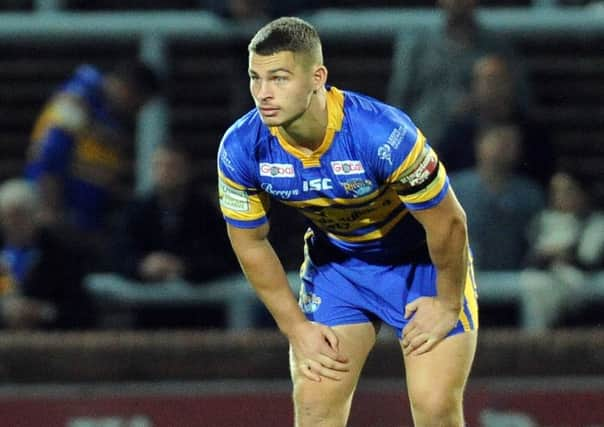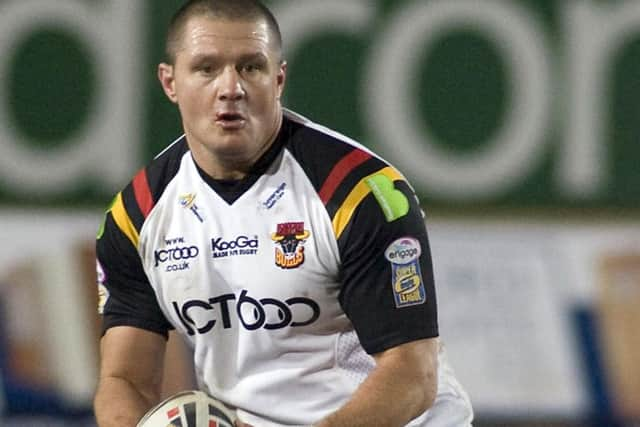Rugby league kicking mental health stigma into touch


WHEN Stevie Ward made his Super League debut for Leeds Rhinos at the age of just 18 he was tipped as a future star.
The Morley-born player was seen as the long-term successor to the mighty Kevin Sinfield after catching the eye in some notable matches, including the Challenge Cup final at Wembley in 2012.
Advertisement
Hide AdAdvertisement
Hide AdThe following year, though, his season was cut short when he suffered a badly dislocated shoulder. After a frustrating spell on the sidelines he returned to action in 2014 but felt he wasn’t firing on all cylinders.


“When I returned I was playing ok but I wasn’t playing to the level I was at before. I wasn’t reaching my potential,” he says.
It sent him on a downward spiral. “You hear people talking about having a black cloud hanging over them and that’s what it was like. I ended up in a dark place,” he says. “As a Super League player your whole life is about playing and training and when I felt I couldn’t play to the level I expected of myself it hit my sense of self-worth.”
He ended up on anti-depressants for a few months but says the club rallied around him. “The club was really good. I went to see the doctor and I was able to talk openly about how I was feeling.”
Advertisement
Hide AdAdvertisement
Hide AdSince then he’s worked on changing his mindset. “I’ve achieved a lot in a short space of time but I’ve learnt not to get carried away with the highs and not to worry too much about the lows,” he says.


Five months ago the 22 year-old launched Mantality - an online lifestyle magazine - which combines everything from travel articles to advice on how to deal with stress.
“As a player you have so much idle time and I felt I needed to do something else to invest my energy in, rather than hanging everything on rugby league. I’ve always been interested in writing and literature and I’ve really enjoyed working on this, it’s got a self-affirming, positive ethos,” he says.
Rugby players are regarded as some of the toughest people in sport but a major recent study into the mental health of rugby league players, carried out by researchers at the University of Huddersfield, estimates that almost a quarter of current players are vulnerable to problems like depression.
Advertisement
Hide AdAdvertisement
Hide AdIt’s something high on the agenda of the Rugby Football League (RFL), the game’s governing body, and since 2015 all Super League and full-time Championship teams are obliged to employ part-time Player Welfare Managers (PWMs) - with the new report compiled for the RFL recommending these posts become full time.
RFL welfare director Emma Rosewarne says players who have what’s known as a high ‘athletic identity’, how they perceive themselves, can be more susceptible to mental health issues.
“Mental health problems can affect anyone but research shows that when it comes to sport the higher a player’s ‘athletic identity’ the more prone they are to stress, depression and anxiety.”
Part of the reason for this is while many people have a variety of interests and hobbies outside the workplace, rugby league players - as with top performers in all sports - tend to define themselves by their sporting achievements, which can be problematic if things go wrong, or when the time comes to hang up their boots.
Advertisement
Hide AdAdvertisement
Hide Ad“Super League players do a job they love but the nature of professional sport can lead to more stresses and strains,” says Rosewarne. “There’s the stress of getting injured and worrying about getting your contract renewed and there’s also the issue of dealing with pain and the associated risk of getting addicted (to painkillers).
“Research has shown that elite sport stars are three times more likely to become addicted to gambling than the general population. This is partly down to time and money but also some players find it replicates the adrenaline they get from match days.”
The rugby league world was left devastated by the tragic death of Terry Newton, the former Rhinos, Bradford Bulls and Great Britain hooker, who was found hanged at his home in 2010.
Leeds Rhinos legend Barrie McDermott was a close friend of Terry’s and says his death made people in the sport sit up and start thinking about depression and mental health. “His friends and a lot of people who knew Terry thought if this could happen to someone like him it could happen to any of us,” he says.
Advertisement
Hide AdAdvertisement
Hide Ad“It still shocks me to this day. There’s a group of us who meet up on the anniversary and talk about him and share stories. We talk about what happened because we didn’t recognise the signs at the time.”
In 2011 the charity State of Mind was launched in Terry’s memory and has since helped raise awareness of mental health issues among rugby league players and communities.
Barrie, a former player welfare manager with the Rhinos, says it’s important that players, and particularly ex-players, have support networks they can access. “There are always likely to be more problems among players post career than during their career. Players get injured or dropped from the team which can have an impact on people but it’s afterwards that’s more of a worry for me,” he says.
“The players are seen as very tough and strong willed, resilient men and that can sometimes make it hard to admit they have a problem. But mental health issues can affect anyone and people are starting to take more notice.”
Advertisement
Hide AdAdvertisement
Hide AdBarrie says the sport is doing all it can with the resources it has. “It is being more proactive about this and it’s getting better each year. We need to visit as many rugby league clubs as possible and sit down with them and talk about mental health, how to recognise the warning signs and what to do if someone seems to be struggling.
“We need to try and fix the problem before it becomes unfixable, we can’t wait for another player to take his own life. We have to be proactive and rugby league is doing that.”
For Stevie Ward, who is back playing after his injury nightmare, it’s about raising awareness of a hidden illness that can afflict even the physically strongest among us.
“When we hear the words ‘depression’ and ‘mental health’ there’s still a stigma associated with them and it’s about changing that perception. And I think it is changing, people are more aware about the issues and they are opening up.”
Advertisement
Hide AdAdvertisement
Hide AdHaving had the courage to speak out and confront his own fears he hopes others will realise they don’t have to suffer in silence.
“It can feel like you’re struggling to find light at the end of the tunnel but people need to know there is light and they can get better.”
Sport helping tackle problems
Rugby league’s governing body is working hard to address issues surrounding mental health in the game.
RFL Welfare director, Emma Rosewarne, says the sport is working alongside the State of Mind charity, which raises awareness of mental health issues, and since 2011 it has worked closely with Sporting Chance - the charity set up by Tony Adams - which runs regular workshops for players as well as providing a counselling service and treatment clinic.
Advertisement
Hide AdAdvertisement
Hide Ad“In the past five years we’ve had around 250 players getting some form of help from Sporting Chance, including academy players through to Super League players and retired players, so this support is making a big difference,” she says.